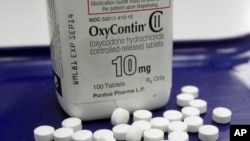The U.S. government is dealing with an epidemic of opioid use.
Americans make up about 4.6 percent of the world’s population, but consume 80 percent of the world’s opioid supply. That information comes from the American Society of Interventional Pain Physicians.
Opioids offer strong pain relief. But they are addictive, according to the Centers for Disease Control and Prevention. Taking too many or too much can be fatal.
Forty Americans die every day from opioid prescription drug overdoses, said the CDC.
This week, the center released new guidelines for relieving pain.
It calls on family doctors to consider other pain relief options before prescribing opioids. Options should include high doses of anti-inflammatory drugs, such as Ibuprofen and aspirin, the CDC said.
When doctors believe severe pain requires opioids, they should prescribe the lowest possible dosage, the CDC said. And patients should be told to exercise and take other steps that could get them off opioids, the agency said.
CDC Director Tom Friedman said: “Overprescribing opioids -- largely for chronic pain -- is a key driver of America’s drug-overdose epidemic.”
The CDC is not acting alone. President Barack Obama in February proposed $1.1 billion to increase treatment options for people addicted to opioids.
And the U.S. Senate recently voted 94-1 to fund treatment programs.
The U.S. presidential candidates have been asked about the problem at town halls and debates. The issue often came up in the first primary state of New Hampshire. New Hampshire has one of the highest opioid addiction rates in the United States.
“We can't be here in New Hampshire and not talk about the addiction problem,” said Democratic presidential candidate Hillary Clinton at a town hall meeting. “Not talk about the fact that there have been more deaths by overdoses than car crashes in this state.”
Republican candidate Donald Trump also spoke about opioid addiction during a New Hampshire rally. “We are going to try and help the young people, and the old people, and the middle-age people, and everybody that got addicted,” he said.
The data show the problem of opioid addiction is growing. This is from a 2016 report prepared by the American Society of Addiction Medicine:
- Four of every five heroin users start by misusing prescription painkillers.
- 94 percent of people in treatment for opioid addiction said they turned to heroin because prescription opioids were “far more expensive and harder to obtain.”
- In 2012, doctors wrote 260 million opioid prescriptions – enough to give every U.S. adult a bottle full of pills.
I’m Kathleen Struck.
Bruce Alpert reported on this story for VOA Learning English. Kathleen Struck was the editor.
We want to hear from you. Write to us in the Comments Section or share your views on our Facebook Page.
_______________________________________________________________
Words in This Story
epidemic – n. a situation in which a disease or problem spreads very quickly and affects a large number of people
opioids – n. a pain reduction drug that is very addictive
addictive – adj. causing a strong and harmful need to regularly have or do something
prescription – n. a written message from a doctor that officially tells someone to use a medicine.
guidelines – n. advice on how something should be done
option – n. something that can be chosen
dosage – n. the amount of a medicine, drug, or vitamin that should be taken
chronic – adj. continuing pain over a long period of time





